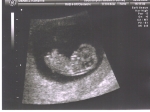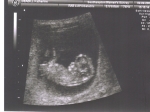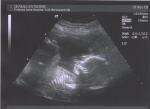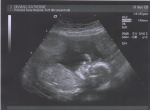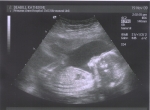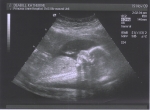10 Sep 2009 • Family
So, for some this is news, for others it’s old news. It seems we’re having another baby. :-)
Yesterday we had the initial dating scan and, broadly speaking everything is fine. Based on size measurements we are at 10+2 (as of today) and the due date is 6th April 2010. We already had a busy few months ahead. They just go busier.
Back in Febraury of 2006 Katie was pregnant with Poppy and despite strong protestations from myself my unborn girl was given the affectionate name of “cookie”. I know, I know. Please direct your mocking towards Katie. That was her work ;-) Anyway, as is always possible it seems this may have come back to bite us. A few weeks ago we told Poppy the news and she has thus far bounced from delighted to indifferent in the way only a small child can. One of her pearls of wisdom was this…
I’m going to call it Doughnut
Oh dear. Please, no. Unfortunately, this also seems to have now stuck. I guess if you can’t beat them, join them.
It’s too early at the moment to talk about gender, that’ll come at the next scan in about 7-8 weeks time. We haven’t decided yet whether we want to know this time, but if we do, we won’t be telling ;-)
The pics from the scan are below. The baby’s the small blob in the middle :-)
07 Apr 2009 • Thoughts
Within Christianity it is believed that amongst the many gifts given by God is the gift of free will. The ability and the right of mankind to choose their own actions and dictate their own destiny. We can be whatever we wish to be, do whatever we dream to do. At times this allows humanity to show it’s darkest side, capable of great evils. The flip-side is that we have been able to expand ourselves to a point where we can achieve miracles, tinker with the very building blocks of creation and, at times, believe that we are ourselves Gods. We are not of course.
Free will is both our greatest blessing and our most unfortunate curse.
Free will forms a small part of the subject about which I wish to write. It’s a subject that has confounded greater minds than mine and yet it is still a matter with which I feel the need to wrestle on more occasions than I’d like. In many ways it seems simple but then I start to look at history and that’s where it becomes anything but.
I’d like to consider Pontius Pilate. A man central to the story of Christ. A man who, it seems, held the fate of the world in his hands. That may sound like an overstatement, perhaps it is, but like I said it’s complicated. You see, Pilate is a great example of the contradiction of free will.
Jesus was God incarnate. God made man and given to walk the Earth as a human. Human emotions, human strengths and human weaknesses. It’s a point on which every branch of the Christian Church agrees. Perhaps more importantly Jesus Christ was crucified in order that human transgressions could be forgiven. Atonement. It is in itself a complex subject, but is again fundamental to Christian faith and belief. No crucifixion, no resurrection, no Christianity. All clear? Well, let’s go over that again. God sent Jesus to Earth in order that he might die and rise again to cleanse sin and conquer death. Simple.
Of course not, otherwise why would I be writing what you are now reading? Remember Pilate? He stood in front of the people and offered them an exit. Offered them a chance to turn Jesus free and save him from death. They declined. Pilate could see no wrong in Jesus, so as the man in charge for Rome he could have simply set him free. He looked, he thought, he chose. Crucifixion. No crucifixion, no resurrection, no Christianity.
So what if Pilate had chosen differently? What if Jesus had been freed? If we are to believe that our will is free and our destiny not yet fixed then we must accept that Pilate had this option. But God sent his son to die for our sins, did he not? So Pilate had no choice, God’s plan foiled by a mere mortal? I imagine not. This is the fundamental conflict inherent in the free will debate. Did God really know that Jesus would die? Or did he just turn the actions of man into an opportunity to save us?
I have no idea as to the answer, I can only barely get to grips with the question. A common answer in this debate is that God doesn’t fix the future but does see the future. That’s unclear. The suggestion is that God is non-contemporaneous, he exists is outside of time. Time is, after all, a human construction. This theory suggests that God did not make Pilate (and others) choose the path they did, nor did he see some fixed point ahead. He simply “understood” what would happen, intuited it perhaps? I don’t know. If anyone does, let me know. You’ll really be helping me out.
16 Oct 2008 • Family
Yes it’s been a while but I really need to capture this…
We have a routine at night with Poppy. Pretty much the same day in day out. That routine involves me getting ready for bed. Have a read of this evening’s conversation:
“Got a head-ache Daddy”
“Really, where’s your head-ache Sweetheart?”
“In my tummy!” :-)
“Pops, we only call it a head-ache when it’s in our head. In our toes it’s a toe-ache, in our tummy it’s a…”
“Baby!”
That’s the result of spending months explaining the baby in Auntie Suzanne’s tummy. :-)
05 Nov 2007 • Thoughts
From time to time in life an event will occur that highlights human mortality in such a stark and unavoidable fashion that it feels like the world has momentarily stopped spinning. It’s at these time that you stop, you think and you fear.
It would seem that we are all supsended on this Earth by the very thinnest of threads. Something so slight, so delicate that we rarely even notice it’s there. We move from place to place, from day to day with no concern for how swiftly, silently, effortlessly that thread can be severed. The light of human life and all its magical potential snuffed out like candle-flame. Immortal to mortal in the blink of an eye. The pain of realisation when that thread is severed, that life is taken away, can be so real as to feel physical. A deep gnawing ache in the pit of your stomach, a cascading torrent of discomfort that can fill every part of your body.
I’m being slightly abstract but, if you know me, or my family you’ll already have realised that I’m writing here about Eleanor. My niece who left this world before any of us had a chance to welcome her, and it makes me want to curl up and hide.
It’s incredible the depth and range of feeling that such an event can invoke. Over the last few weeks I’ve seen facets of the people closest to me that I might otherwise never have known. Interestingly they are, without exception, positive in one way or another. I’ve seen people exhibit strength beyond expectation, show the love and compassion that humankind seem to only show at such times. I’ve seen people passionate, angry, calm, trusting and relying on a personal faith in a time when they need it most.
It is, though, the anger that raises the questions. Anger born out of passion for potential unfilled, moulded out of the challenges you never thought you’d face and out of that fear that manifests when our delicate mortality is thrust so clearly into vision. Everything you once thought true is questioned when viewed through such an event. How can this happen? Why did this happen? I have faith and a God I though I could trust, I though I could rely on. How? Why?
Understand, it’s not that this time shakes a belief in God, more that it aggressively questions the nature of that God. In anger born of fear I am forced to confront and question a God who may not be what “he” was before. It’s hard to be rational about such an emotive subject but let’s try.
You see, we find ourselves at the very heart of Christianity’s toughest question. The matter of human suffering. God is omnipotent, capable of all things. So tell my why he let this happen? With no effort at all he could have made everything different, everything better. Yet, he didn’t. Why not?
To my mind the first answer here is two questions, did he do nothing? Or could he do nothing? Is God impotent in these situations, or does he “choose” to do nothing? It’s a question with answers so fraught with contradiction that it’s no wonder no-one’s found a satisfactory answer. I don’t suggest I’m going to find one here, but I might explore those contradications a little.
Let’s start by assuming God can do nothing, his hands are tied. People will often shout here “free will!”, the notion that for God to intervene in the pain of his children would somehow impinge on the freedoms he’s given us. It’s a convenient answer sure, but it’s not a satisfying one. It implies that someone somewhere made some choice, set into action some chain of events that “caused” our little one to die. It implies, karma. This has nothing to do with free will. No-one willed this, and no-ones freedoms would be affected if God had intervened to stop it.
Alternatively, perhaps God isn’t omnipotent. Our creator God, guiding hand behind the universe isn’t all-powerful? The very notion seems crazy. To believe in the omnipotence of God seems a fundamental prerequisite to believing the actions of God, perhaps the existence of God. Could anything but an omnipotent God have performed such great acts as creation? It seems unlikely. Whichever way you shake this, and however painful it is, I believe we must accept that God had the power to change this, and didn’t.
So, does God not care? Or is he simply pre-occupied with matters elsewhere? To belive either of these things would be to believe in a heartless God, a God who’s so indifferent to the suffering of his people that he would either watch as his people suffered or simply not notice. This is the same God who sent his own child to his people in order that they might kill him in horrific and painful fashion. The same God that would take on that level of suffering to save his people from their own sin. Unless something has changed in the last 2000 years, God cares. God is aware of his people. In the single most obvious example of God’s intervention in the world we must find evidence that God loves. Yet still the innocent are taken from us.
God could intervene, but doesn’t. God sees and cares, but does nothing. Anger, fear, confusion. Driven by the limits of our understanding. I really don’t know what to think. The odd thing is I never expected God to protect me from this sort of thing. I never thought it would come so close to home. Then it did, and everything changed. Everything. It’ll never be quite the same. I can never again relax quite so much into the belief that tomorrow I’ll awake to Katie and Poppy just the same as today. That’s the fear. It’s no more likely now than it was, it’s simply far more in my mind. What if?
When all is said I must wonder do I, when blessed with so much, have any right to question God when his blessings are not forthcoming?
It’s been several weeks now since I started writing this (I know, I’m slow), and while this have calmed somewhat I’m still suprised how tough this is and how fantasticly Mike and Suzanne are dealing with it. It feels kind of wierd dropping this online like this, but what the hell, get it out there, let it go and move on. Keep safe.
